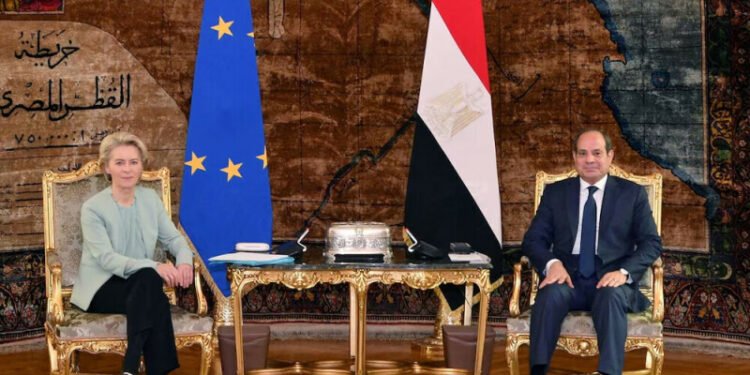CAIRO: European leaders are expected to announce a multi-billion euro funding package and an upgraded relationship with Egypt in Cairo on Sunday, part of a push to stem migrant flows across the Mediterranean that has been criticised by rights groups.
The agreement is designed to enhance cooperation in areas including renewable energy, trade, and security while delivering grants, loans and other funding over the next three years to support Egypt’s faltering economy.
European governments have long been worried about the risk of instability in Egypt, a country of 106 million people that has been struggling to raise foreign currency and where economic adversity has pushed increasing numbers to migrate in recent years.
Inflation has been running close to record highs and many Egyptians say they struggle to get by.
Over the past month, however, the financial pressure on the government has eased as Egypt has struck a record deal for Emirati investment, expanded its loan programme with the IMF, and sharply devalued its currency.
Diplomats say Egypt’s strategic importance has been underscored by the conflict in neighbouring Sudan, which has created the world’s biggest displacement crisis, and the war in Gaza, which borders Egypt’s Sinai Peninsula.
Egypt has been the main conduit for international humanitarian aid sent to Gaza, and along with Qatar and the United States has been trying to mediate a truce between Israel and Hamas.
European Commission President Ursula von der Leyen will lead a delegation on Sunday that also includes the Italian and Greek prime ministers and the Cypriot president.
Egypt’s finance minister has said the government has lined up a total of $20 billion in multilateral support after increasing its loan and economic reform programme with the IMF.
Egypt sets procurement price of local wheat at $41.32
Of that, funding from the European Union is expected to total $5-6 billion, Finance Minister Mohamed Maait told Asharq Business.
Egyptian officials say Egypt deserves recognition for hosting an estimated nine million foreign residents and largely shutting off irregular migration from its north coast since 2016.



 Pakistan Rupee Exchange Rate
Pakistan Rupee Exchange Rate





